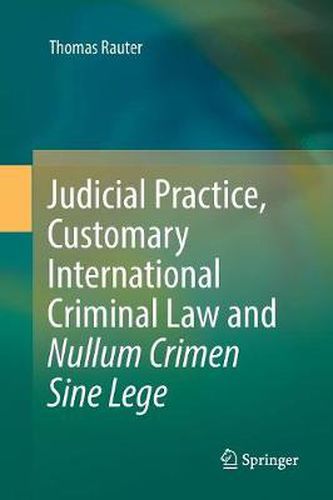Readings Newsletter
Become a Readings Member to make your shopping experience even easier.
Sign in or sign up for free!
You’re not far away from qualifying for FREE standard shipping within Australia
You’ve qualified for FREE standard shipping within Australia
The cart is loading…






This title is printed to order. This book may have been self-published. If so, we cannot guarantee the quality of the content. In the main most books will have gone through the editing process however some may not. We therefore suggest that you be aware of this before ordering this book. If in doubt check either the author or publisher’s details as we are unable to accept any returns unless they are faulty. Please contact us if you have any questions.
This study analyzes the methods used by international criminal tribunals when determining customary international criminal law and to consider the compatibility of these approaches with the nullum crimen sine lege principle. In this context, the following research questions are of particular importance: Is there one approach common to all international criminal tribunals, or can different approaches be detected in their jurisprudence when determining customary international law? Do international criminal tribunals regard both traditional elements of customary international law - State practice and opinio iuris - as necessary elements for the establishment of customary international law? Do international criminal tribunals argue along the lines of the International Court of Justice (ICJ), requiring a high frequency and consistency of State practice that is both extensive and virtually uniform ?In addition, the book analyzes the evidence used by international criminal tribunals in order to establish the constituent elements of customary international. It then poses the question: Do international criminal tribunals distinguish, as defined by Schwarzenberger, between the law-creating processes of public international law on the one hand, and the law-determining agencies as a subsidiary means of determining rule of law on the other?Assuming that they exist, how can different methodological approaches to determine customary international law be assessed in light of the nullum crimen sine lege principle? Does the principle require judges to apply the traditional method to establish customary international law as being based on extensive, uniform and enduring State practice accompanied by opinio iuris? Can the principle balance the desire for justice and the specificities of law creation of the international legal order with fairness for the accused? How can the law be accessible and criminal punishment foreseeable, when the underlying legal basis for criminal convictions, namely customary international criminal law, is unwritten in nature?
$9.00 standard shipping within Australia
FREE standard shipping within Australia for orders over $100.00
Express & International shipping calculated at checkout
This title is printed to order. This book may have been self-published. If so, we cannot guarantee the quality of the content. In the main most books will have gone through the editing process however some may not. We therefore suggest that you be aware of this before ordering this book. If in doubt check either the author or publisher’s details as we are unable to accept any returns unless they are faulty. Please contact us if you have any questions.
This study analyzes the methods used by international criminal tribunals when determining customary international criminal law and to consider the compatibility of these approaches with the nullum crimen sine lege principle. In this context, the following research questions are of particular importance: Is there one approach common to all international criminal tribunals, or can different approaches be detected in their jurisprudence when determining customary international law? Do international criminal tribunals regard both traditional elements of customary international law - State practice and opinio iuris - as necessary elements for the establishment of customary international law? Do international criminal tribunals argue along the lines of the International Court of Justice (ICJ), requiring a high frequency and consistency of State practice that is both extensive and virtually uniform ?In addition, the book analyzes the evidence used by international criminal tribunals in order to establish the constituent elements of customary international. It then poses the question: Do international criminal tribunals distinguish, as defined by Schwarzenberger, between the law-creating processes of public international law on the one hand, and the law-determining agencies as a subsidiary means of determining rule of law on the other?Assuming that they exist, how can different methodological approaches to determine customary international law be assessed in light of the nullum crimen sine lege principle? Does the principle require judges to apply the traditional method to establish customary international law as being based on extensive, uniform and enduring State practice accompanied by opinio iuris? Can the principle balance the desire for justice and the specificities of law creation of the international legal order with fairness for the accused? How can the law be accessible and criminal punishment foreseeable, when the underlying legal basis for criminal convictions, namely customary international criminal law, is unwritten in nature?